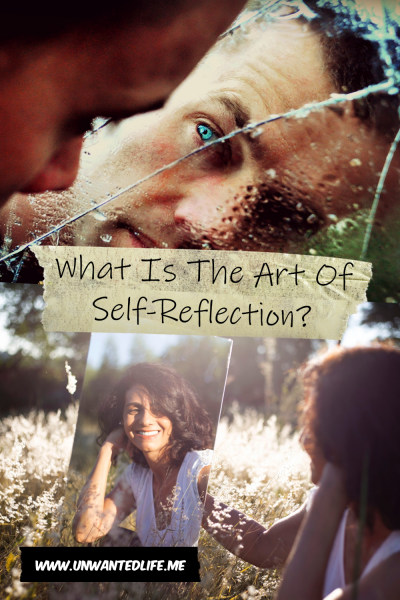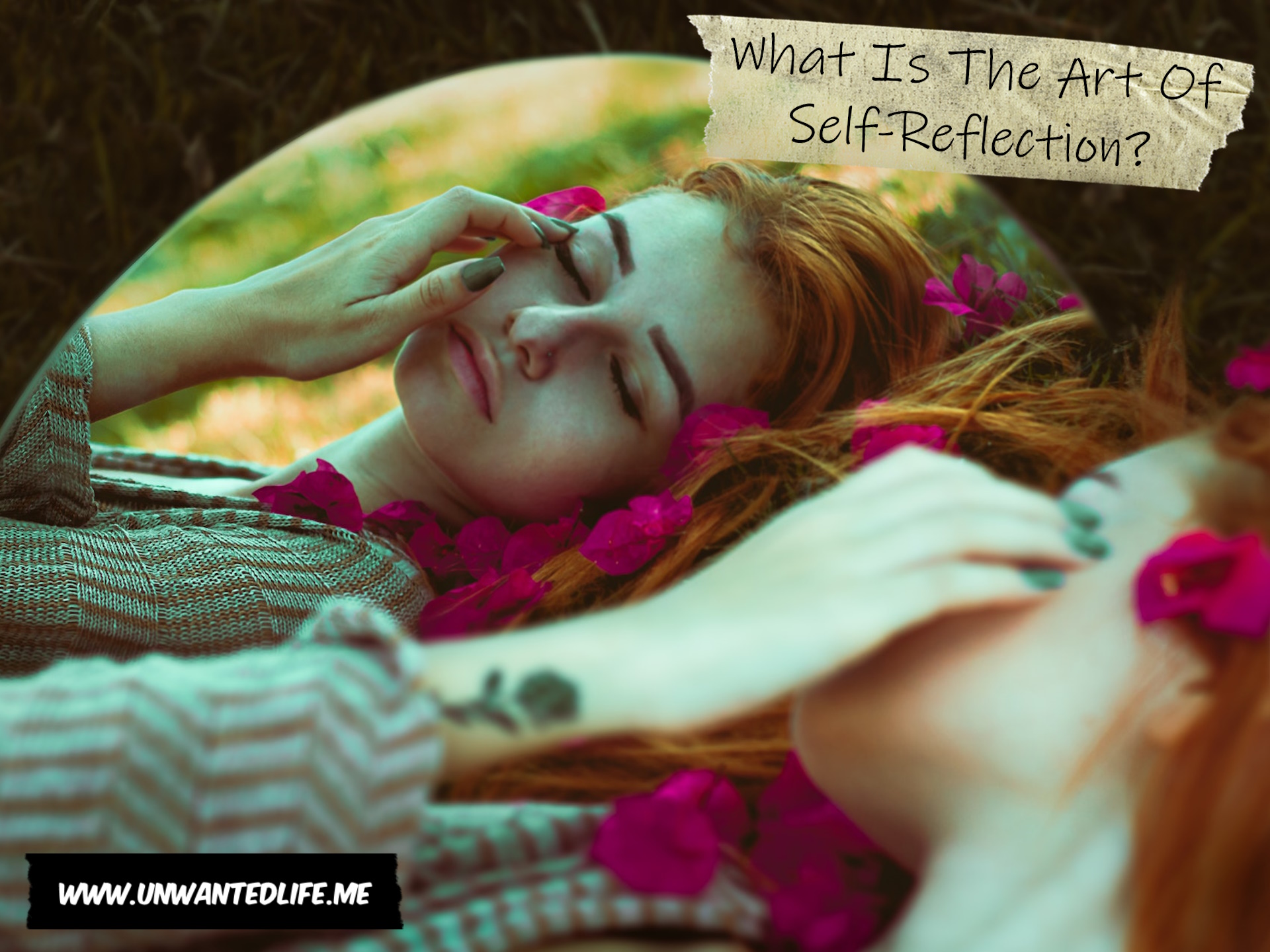Today’s article is the last in the two-part series while also doubling as a standalone article. So I hope you enjoy my article on the art of self-reflection. Something everyone should add to their wellbeing toolbox.
What Is Self-Reflection?
In the simplest of terms, ‘reflection’ means to think about something (Open University), and self-reflection is to think about yourself. Thus, self-reflection is the mental process that allows you to grow your understanding of who you are, what your values are, and what causes you to think, feel, and act the way you do (The Berkeley Well-Being Institute).
The art of self-reflection means you’re basically looking into a mirror and describing what you see, which allows you to assess yourself (Open University). The benefits of this kind of self-assessment are that it allows you to be conscious of who you are and what drives you, as well as it making it easier for you to change, develop, and improve as a person (The Berkeley Well-Being Institute).
The Art Of Self-Reflection
The art of self-reflection is the practice of looking inward and examining one’s thoughts, emotions, and actions. It involves gaining a deeper understanding of oneself, one’s motivations, beliefs, strengths, and weaknesses. Self-reflection is an essential tool for personal growth, self-awareness, and self-improvement. It allows individuals to gain insights into their behaviour and make positive changes in their lives.
Self-awareness
Self-reflection helps you become more self-aware. By examining your thoughts, feelings, and behaviours, you gain a better understanding of who you are, what drives you, and how you relate to the world around you. This self-awareness provides a solid foundation for personal growth and decision-making.
Emotional intelligence
Self-reflection enhances emotional intelligence by helping you recognise and understand your emotions. It allows you to identify patterns in your emotional reactions and explore their underlying reasons. This awareness helps you regulate your emotions effectively and navigate relationships more skilfully.
Personal growth and development
Engaging in self-reflection enables you to identify areas for personal growth and development. By assessing your strengths and weaknesses, you can set goals, make positive changes, and enhance your skills. Self-reflection provides an opportunity for continuous learning and self-improvement.
A study by Duggan, Bradshaw, Carroll, Rattigan, and Altman (2009) highlighted how this knowledge from self-reflection and personal growth and development can be used. They conducted a study that involved the training of medical students through interaction with standardised patient educators with disabilities.
Although these students would have an awareness of disability conditions beforehand, the study found that the students’ reflections showed an increase in understanding of patients with disabilities. They were able to learn how disability, pain, everyday life, and treatment were connected. They also recognised the expertise of the conditions and health that the standardised patient educators with disabilities. Something doctors don’t often factor in is the reality of living with these conditions, which you can best understand if you’ve lived it.
I signed up to join a programme to help doctors learn about mental health using a similar type of programme. The programme was designed to help those doctors get a better understanding that mental health conditions can present in different ways and that people with mental health conditions can be high functioning. It also helped to reduce stigma from biases they may have brought with them before training to become doctors.
Improved decision-making
By practising self-reflection, you gain clarity about your values, priorities, and goals. This clarity helps you make more informed and aligned decisions. By understanding your own biases and motivations, you can approach decision-making with greater objectivity and foresight.
Problem-solving and problem-prevention
Self-reflection allows you to analyse challenges and problems more effectively. By examining your role in the situation and considering alternative perspectives, you can develop creative solutions and learn from past experiences. Additionally, self-reflection can help you identify recurring patterns or behaviours that contribute to problems, enabling you to proactively address them.
Enhanced relationships
Self-reflection fosters empathy and understanding, which can improve your relationships with others. By gaining insight into your own thoughts, feelings, and behaviours, you become better equipped to understand and relate to the experiences of those around you. This deeper understanding can strengthen communication, resolve conflicts, and build more meaningful connections.
Practising The Art Of Self-reflection
Create a quiet and uninterrupted space
Find a calm environment where you can focus on your thoughts without distractions. This could be a peaceful corner of your home, a park, or anywhere that allows you to have a reflective atmosphere.
Set aside dedicated time
Allocate specific times in your schedule for self-reflection. It could be daily, weekly, or whenever you feel the need for introspection. However, it’s worth remembering that consistency is key to developing this as a habit.
Journaling
Use a journal to write down your thoughts, feelings, and observations. Journaling helps externalise your internal world and provides a record of your reflections over time. It can also be a therapeutic practice.
Ask yourself meaningful questions
Pose open-ended questions to yourself that encourages deep introspection. Examples include: What are my core values? How did I handle a recent challenge, and how could I improve? What am I grateful for in my life? What are my long-term goals?
Practice mindfulness
Cultivate mindfulness to become fully present in the moment. Mindfulness allows you to observe your thoughts and emotions without judgment, enhancing self-awareness, and facilitating reflection.

Summary
Much like mindfulness, self-reflection is an ongoing practice that requires patience and self-compassion. Embrace the process, be open to self-discovery, and use your insights to make positive changes in your life.
As always, leave your feedback in the comments section below. Also, please share your experiences with self-reflection in the comments section below as well. Don’t forget, if you want to stay up-to-date with my blog, then sign up for my newsletter below. Alternatively, get push notifications for new articles by clicking the red bell icon in the bottom right corner.
Lastly, if you’d like to support my blog, you can make a donation of any size below. Until next time, Unwanted Life readers.
References
Duggan, A., Bradshaw, Y. S., Carroll, S. E., Rattigan, S. H., & Altman, W. (2009). What can I learn from this interaction? A qualitative analysis of medical student self-reflection and learning in a standardized patient exercise about disability. Journal of Health Communication, 14(8), 797-811. Retrieved from https://www.tandfonline.com/doi/abs/10.1080/10810730903295526.


Very helpful post, this post speaks to me because its something I always work on. Thank you for sharing!
Thanks for commenting
I LOVED this post. Self reflection is something that is important to me and that I like to explore when using my journal. I also like to reflect at the end of a week, month and year. As well as big occasions such as a birthday. These are some great tips to help people who haven’t ever tried self-reflection before. Thank you for sharing.
Lauren – bournemouthgirl
Thank you for sharing your self-reflection routine
An excellent article. I totally agree, my emotional wellbeing really began to change for the better after studying mindfulness, which then led me on to Stoic philosophy and further. My life has changed, and journaling my thoughts as well as meditating has really placed me on the path I am now on, and opened up the confidence in myself to do the things I am doing. Self-reflection is part of that. This week I performed a solo show in a fringe festival for the first time. I journaled the outcome and how it made me feel, and while we may think we need only journal our problems, I also journaled how proud I felt that I had come this far. It is important for us all to acknowledge when we have done something well. Thank you as ever for your wisdom with your writing.
Acknowledging your achievements is important, and something that can be easily done in a journal. Thanks for sharing
Self-awareness is something I’ve been working on lately, and I think self-reflection can be such an important tool. Thank you for sharing this well-researched article 🙂
Thank you for commenting
Love this post. I think self awareness and reflection are key to growth and being a generally good person (unless you’re lucky enough to be a natural angel). However, the danger is that sometimes some people reflect and only see their mistakes and the negative impact they’ve had, which can be destructive too.
I hadn’t considered that reality when writing this article, but you’re absolutely right. Some people might only see the negatives if they can’t reflect objectively. So it might be a good idea for people to consider if they can be objective or if they’ll be biased by their thinking errors, before attempting self-reflection. Thanks for sharing your thoughts
Ever since I’m in my 30s, I love self reflecting myself. It really helps me to grow wiser.
Thanks for commenting
Self-reflection is crucial for personal growth. It enhances self-awareness, improves emotional regulation, and fosters resilience. By identifying strengths and areas for improvement, individuals can make more informed decisions and enhance their overall mental well-being
Indeed. Thanks for commenting